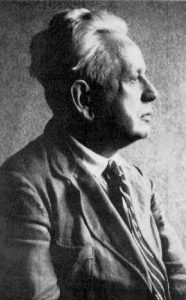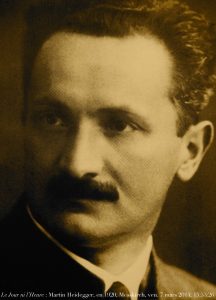Almost 90 years ago, an intellectual battle was waged between German philosophers Ernst Cassirer and Martin Heidegger in the Swiss resort of Davos. Cassirer, a staunch defender of democracy, was fighting for the survival of the Weimar Republic against the rise of National Socialism, whose philosophical propagandist Heidegger would become. Humanism clsashed with a state of war…

©Public Domain / Wikimedia
On March 26, 1929, the eminent philosopher Ernst Cassirer (1874-1945) and the rising star Martin Heidegger (1889-1976) met for a debate in Davos. The result was a historic disputation between democratic and authoritarian worldviews. In his book Zeit der Zauberer, Wolfram Eilenberger recreates the duel in the Swiss mountains as a Wild West showdown. Cassirer was an emphatic supporter of the Weimar Republic. Heidegger was already showing signs of the “turn” that would see the acclaimed author of Being and Time (1926) become an apologist for National Socialism.
Whoever came up with the idea for the duel almost certainly and with unerring instinct had in mind the eternal war of words between the rational enlightener Settembrini and the mystical Jesuit Naphta in Thomas Mann’s Magic Mountain, a novel set in Davos. In the real-life version, Cassirer played the role of Settembrini; Heidegger stood in for Naphta.
In his life and work, Cassirer was the quintessential democrat – a staunch advocate of ethical and rational humanism. Not long before the Davos debate, Cassirer had been invited by the Hamburg senate to give a speech celebrating the anniversary of the democratic Weimar constitution. And Cassirer delivered. Marshalling all his philosophical erudition, he vigorously refuted the widespread argument that democracy had been imposed upon the Germans and that Weimar and its constitution was somehow “un-German.” In what was at times a rather lofty philosophical defense, Cassirer drew a sweeping line from Leibniz’s philosophical support of certain inalienable rights for serfs and slaves to the American Bill of Rights and the French Revolution, contending that this political and intellectual tradition had found its way back to Germany through that most German of philosophers, Immanuel Kant.
What is Man?
Aby Warburg, a German cultural theorist and patron of the arts, was taken with the lecture, which he described as a “preface to the Magna Carta of the German Republic.” Warburg asked Cassirer for permission to prepare a special print edition of his speech.
But Cassirer’s wife Toni remained skeptical of the speech’s political utility. As she later recalled: “Many of the ‘persons of concern’ were nowhere to be seen after the festivities. Those who were convinced were, as always, those who wished to be convinced. To shake Germany out of its stupor would at the time have required other means, which Ernst was not accustomed or inclined to employ.”
Cassirer also would not find those means at the Davos dispute. Instead, he remained largely on the defensive. Heidegger was widely regarded as the winner of the disputation – and as the challenger, his task was certainly an easier one. Cassirer’s health was also flagging during the week of preparation in advance of the dispute. By contrast, and in keeping with his rather cultivated image as the robust and vigorous philosopher of the dawning era, Heidegger and his cohort of admirers and sycophants spent much of the week before the disputation on the ski slopes.
The theme of the disputation was the Kantian question, “What is Man?” But the theme was not as philosophically traditional and immaterial as it sounded. By that time, the figure of Kant as a representative of Enlightenment and Republican thought had unexpectedly stumbled into a political battle zone. Nationalist-conservative and völkisch thinkers were seeking to recover the “German” Kant from the clutches of the “Jewish” Kant they claimed was being propagated by the Neo-Kantian school, most prominently by the Jewish philosopher Hermann Cohen and, of course, Ernst Cassirer.

Ernst Cassirer
©Public Domain / Wikimedia

Martin Heidegger
©Renaud Camus / Flickr / 14598743123_eb7c3ed9a3_o / (CC BY 2.0) / https://creativecommons.org/licenses/by/2.0/
For the National Socialists, this battle over philosophy was a matter of great significance. Four weeks before the 1929 Davos dispute, Adolf Hitler was feted by his supporters for paying a visit to a lecture on Kant being held by an ideological fellow-traveler in Munich, who also extended Hitler a personal welcome. At a time when German universities still regarded themselves as entirely apolitical, this stunt raised more than a few eyebrows.
The disputation at Davos, by contrast, was a more sedate affair. Cassirer expanded on his guiding principle, arguing that the human spirit adopts forms that allow him to overcome his existential anxiety and lead a human life. This was the philosophical foundation for the concept of “freedom in security,” as we might call it today.
Heidegger, by contrast, sought to demonstrate that “the task of philosophy is to cast man back from the laziness of using the works of the spirit onto the hardness of his fate.” Today, we know that Heidegger was beginning his move toward National Socialism. In that sense, we can interpret his arguments at Davos as an attempt to make his existential philosophy of “Being toward the end” available to the völkisch movement and its rhetoric of heroic self-sacrifice.
But the Davos duel was fought in a civilized manner, not unlike a boxing match being waged in kidskin gloves. For observers, it was only dimly apparent that the rather dry, academic language on evidence heralded a profound turning point.
The correspondent of the Neue Zürcher Zeitung described the encounter as follows: “Rather than watching two worlds collide, the viewer enjoyed at most a theatrical performance, involving two monologues, one by a very nice man, and another by a very violent man who, however, made a terrible effort to be nice.”
Viewed from our contemporary remove, this characterization is still an apt one. The Davos disputation reads like a lofty duel in which a rather traditional and staid republican pathos is countered by a wild and rebellious mode of thought that seeks to demolish all certainties in support of a state of war.
Guilt and complicity
In defense of existentialism, however, it must be noted that Heidegger’s “turn” was not immanent in his central work. The existential philosophy of Being and Time fascinated even leftwing thinkers such as Herbert Marcuse and Jean-Paul Sartre, who cast a critical eye on the alienated and mechanized world. The Jewish philosophers Walter Benjamin and Ludwig Wittgenstein, whose intellectual trajectories are also described by Eilenberger in Zeit der Zauberer, were also closer to the existentialism of Being and Time than to Cassirer’s dignified rationalism.
The special twist that Heidegger lent to his existential philosophy was much more a personal choice than a purely logical outcome. After all, even when a philosopher is cast into the world, there is nothing that compels him to submit to any particular political movement. Heidegger wanted to become the “master thinker” of what he saw as the dawn of a new age, and to enjoy all the career opportunities he believed it might bring. In 1933, Heidegger was appointed rector of the University of Freiburg after his Social Democratic predecessor was dismissed. Heidegger would later distance himself from National Socialism. But he embedded this volte-face into a sweeping critique of the alienation wrought by modern technology that allowed him to brand Americans and Jews as avatars of the greater evil. In so doing, he relativized his own guilt and complicity. It was this tendency which Heidegger’s student, Hans-Georg Gadamer, would describe as a clear failure of self-reflection. And Ernst Cassirer, the staunch defender of the Republic? He departed for Switzerland as soon as the Nazis came to power. Not to engage in further disputation, but to seek safer shores. Cassirer’s path of exile eventually took him to Sweden, England and the United States. He died in New York City on April 13, 1945, only a few weeks before the Allied victory.■
